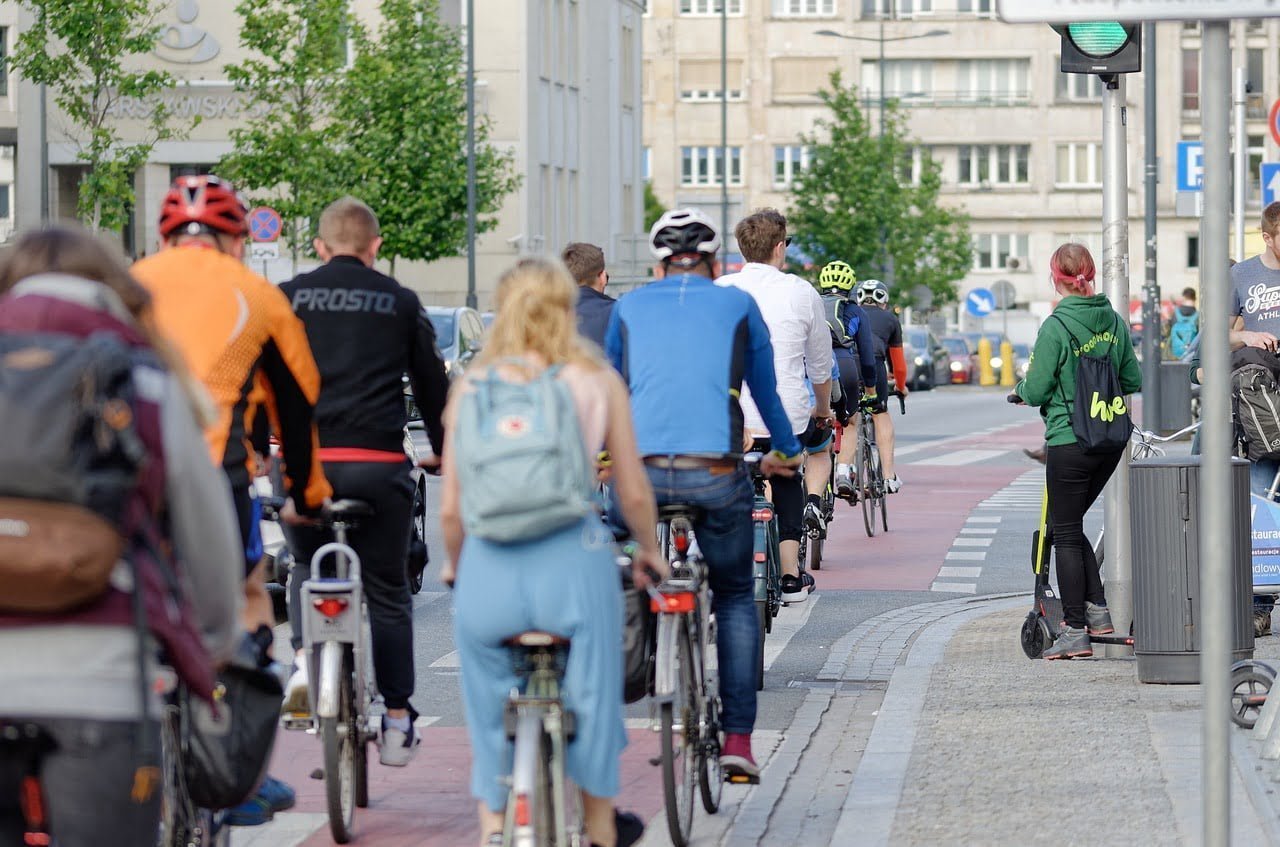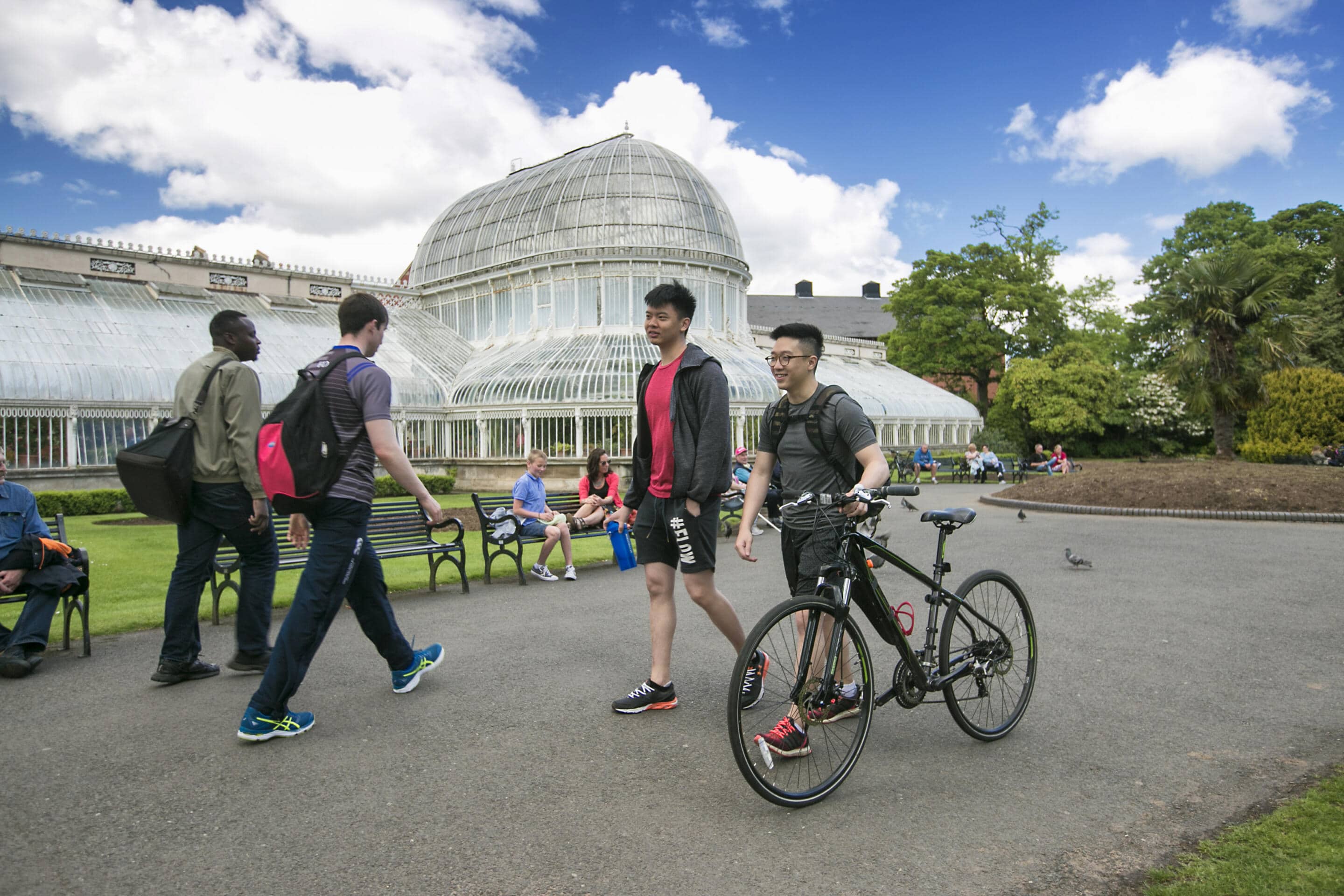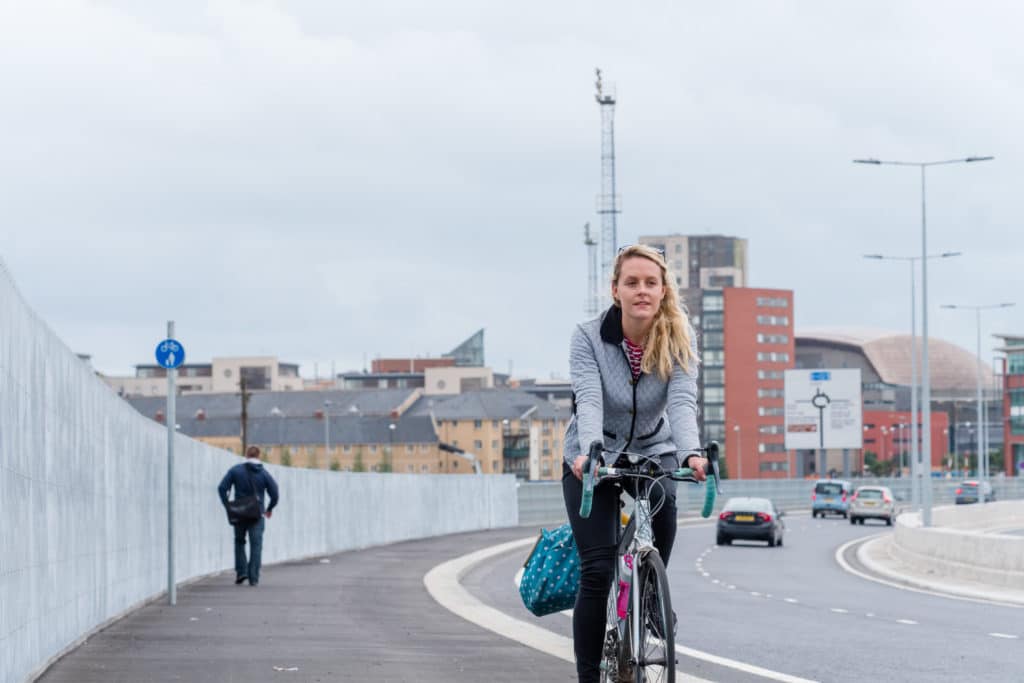Nothing but the youth
Transport availability has a huge impact on the life-choices young people make and access to transport is key to defining the options that young people have. Dr Kiron Chatterjee, Dr Miriam Ricci, Dr Andy Cope and David Corner explain why young people deserve the right to fairer mobility
We can all relate to the question of whether we can get to the places we want to go at the times we want to be there. These challenges play out even more emphatically for younger people, partly because their options may be fewer (e.g. many do not have access to a car) and their destinations of choice are often more diverse. Also, these challenges are especially profound for young people from poorer parts of society.
For example, if a local college doesn’t run the subject that a young person is interested in, is it possible for that individual to access a more distant college that does support their preferred subject? If a job offer is made, can an individual get to that place of work? Quite simply, there is no point having good jobs and services if young people cannot get to them.
In the UK, there is increasing recognition of the wide range of factors that influence long-term health outcomes for young people. These include families, education, employment, youth services, and local identity. But another major factor is transport. Transport is identified as a factor that can enable, or that can limit choices, by young people in urban and rural areas, from all sections of society, and with all categories of needs.
The Health Foundation, is an independent charity committed to bringing about better health and health care for people in the UK, and the second largest endowed foundation in the UK focusing on health. The Health Foundation is conducting a Young People’s Future Health Inquiry. The Inquiry aims to build an understanding of the influences affecting the future health of young people (for the purposes of this exercise aged 16-24 years).
THE IMPACTS OF INADEQUATE TRANSPORT
The University of the West of England in Bristol and Sustrans were commissioned by the Health Foundation to review young people’s access to transport in the UK, to explore the ways that they use transport, and to assess the impacts this has on their lives.
In the UK, there is increasing recognition of the wide range of factors that influence long-term health outcomes for young people. These include families, education, employment, youth services, and local identity. Another major factor is transport.
The study found that young people have become increasingly reliant on getting lifts by car as journey distances have increased over time. However, when young people reach driving age they are less likely to get a driving licence than was the case before the turn of the millennium and they make fewer trips than before . As a consequence, buses are much more important for young people moving into adulthood (those 17-20 years of age) than for any other age group and this is particularly the case for those living in a household without a car.
The study reviewed research and identified eight ways in which transport can influence life course and health outcomes:
- Education and training options – Young people can have limited local education and training options due to lack of transport to get to more distant opportunities
- Participation in out-of-school activities – A household car enables children to participate to a greater extent in out-of-school activities; participation in out-of-school activities has been shown to benefit children economically in the long run
- Physical activity and mental well-being – Walking and cycling contribute significantly to recommended physical activity levels for young people who travel in these ways and physical activity is linked to better mental well-being
- Independence, autonomy and self-worth – Independent mobility allows young people to develop social connections and choose their own activities, providing increased autonomy in their lives
- Capabilities and willingness to use transport options – Young people supported and encouraged to use alternatives to the car as children are more likely to be willing to use them when older
- Employment opportunities – Young people are disinclined from considering jobs with difficult journeys by public transport and employers are reluctant to offer jobs to them
- Stress, fatigue and low self-esteem – Poor quality of the built environment for walking (unattractive, mistreated and ‘forgotten’ places) causes psychological and emotional stress
- High transport costs and job/housing immobility – Young people are less likely to change their job or move home to seek improved career opportunities than previously was the case with high transport (and housing) costs seen as contributory factors
Dr Andy Cope, Director of Insight at Sustrans said “In the interests of fairness and equality, it is essential that transport helps to maximise the opportunities that young people have. This is crucial to supporting positive health outcomes for more young people.
“The dividends of improved health outcomes, in terms of the reduced burden on health care services, could be considerable”.
With this in mind, the report makes a series of recommendations that seek to overhaul transport to give young people the best possible start in life.
Jo Bibby, Director of Health at the Health Foundation said “In many places, we were told that the local transport on offer did not meet the needs of young people; that it was too expensive and not frequent enough.
“This is an issue because the places we go to learn and work in our younger years are vital to setting ourselves up for a healthy future and the potential risks posed by any barriers to accessing these should not be underestimated. Those who are unable to access education, work, services, or maintain relationships with friends, family and communities due to a lack of adequate transport infrastructure face serious implications for their independence and quality of life. A lack of transport options can also make relationships difficult and ultimately result in feelings of isolation, not to mention limiting access to vital local youth services”.
 Dr Kiron Chatterjee, Associate Professor in Travel Behaviour at the University of the West of England said “Transport directly affects the education, training and employment choices available to young people. It affects the opportunities young people have to participate in extra-curricular activities – which have been shown to be highly beneficial for future prospects. If young people are unable to travel independently this has been shown to restrict their social development and the autonomy they have over their lives.
Dr Kiron Chatterjee, Associate Professor in Travel Behaviour at the University of the West of England said “Transport directly affects the education, training and employment choices available to young people. It affects the opportunities young people have to participate in extra-curricular activities – which have been shown to be highly beneficial for future prospects. If young people are unable to travel independently this has been shown to restrict their social development and the autonomy they have over their lives.
“Relying on limited means of transport, such as getting lifts, has been found to inhibit young people’s activities. Where young people are supported and encouraged to use alternatives to the car as children, they are more likely to be willing to use them when older. If they walk or cycle this has been shown to contribute significantly to achieving recommended physical activity levels as well as contributing to better mental health”.
LINE OF BEST FIT
One of the key recommendations is for governments to invest more heavily in walking and cycling. This suggestion would help transport to better align with preventive care priorities, and has recently been endorsed by major stakeholders in health in the UK, perhaps most notably the Chief Medical Officers and the British Medical Association. Schools and other educational institutions should have appropriate infrastructure to provide for them to be reached by walking and cycling, and infrastructure for cycling and walking should address the needs of younger people in terms of destinations, amenity and convenience. The planning system should prioritise the creation and retention of jobs for younger people in locations that can be served by walking, cycling or public transport.
Infrastructure for cycling and walking should address the needs of younger people in terms of destinations, amenity and convenience
It is clear that the transport issues facing young people vary across the country and this must be responded to by policymakers both at a national and regional level. We are seeing some positive movement locally with the recently launched Our Pass initiative in Manchester, which allows 16 to 18-year-olds to travel for free on local buses right across Greater Manchester.
Additionally, the Apprenticeship Travelcard launched by the Mayor of Liverpool, Joe Anderson, is giving young apprentices half price train travel. One thing that both of these schemes have in common is their emphasis on the connection between transport, education and the world of work.
Having joined up policies which enable young people to access the key building blocks for a healthy future, including secure work and the right skills, is vital for securing our nation’s greatest asset, the future health of our society.
For many young people, transport can steer decision making that is crucial to the course that their lives take. These sorts of decisions can profoundly affect health outcomes in later life.

Walking and cycling have been shown to improve young people's mental health as well as their physical health
RECOMMENDATIONS…
RE-PRIORITISING INVESTMENT
Recommendation 1 – Transport subsidies should be redirected as a force for positive change for young people.
Subsidies and policies that stimulate car use carry negative effects on public health and tend to impact disproportionately on those living in more deprived areas.
A transformative transport system would reward positive travel choices, rather than locking-in behaviours with a greater negative cost to society, and thereby benefit younger people.
Recommendation 2 – Government needs to support systems for concessionary fares, bursaries and loans that are clear, universal and consistently applied.
Concessionary fares systems need to be non-discretionary and funded across the UK to benefit those younger people who are most in need of reduced travel costs.
Concessionary fares should cover all those subject to compulsory study or training (16 and 17-year-olds) and all those people under 25 looking for work and in the first months of employment.
Recommendation 3 – Government should invest a greater proportion of the overall transport budget in walking and cycling and encourage younger people to travel actively.
Transport investment should align with the move towards preventive healthcare.
Too few young people are walking or cycling, partly due to poor physical environments to do so and partly due to not developing skills and capabilities.
The planning system should prioritise the creation and retention of jobs for younger people in locations that can be served by walking, cycling or public transport.
Schools and other educational institutions should have appropriate infrastructure to provide for them to be reached by walking and cycling, and infrastructure for cycling and walking should address the needs of younger people in terms of destinations, amenity and convenience.
ENHANCING DECISION-MAKING
Recommendation 4 – Transport planning decisions should acknowledge the impacts of transport on young people and reflect the need to reduce inequality in transport access in the investment decision-making process.
Decisions on transport planning do not sufficiently acknowledge the wider societal and well-being impacts of transport for young people.
Investment decisions should be guided by whether they reduce inequality in transport access, including for young people.
Recommendation 5 – Planning regulations should ensure that housing connects younger people to sustainable transport options.
A new development that is attractive to younger people should, wherever possible, be located within or adjacent to existing urban areas or commuter hubs.
Existing housing stock that is suited to younger people should be connected to transport infrastructure that supports mobility for younger people.
BETTER UNDERSTANDING YOUNG PEOPLE'S NEEDS
Recommendation 6 – Transport regulators and providers should engage with local youth councils and other fora to ensure they are aware of the needs and views of younger people on local transport issues.
There needs to be a clearer voice for young people in planning and delivering transport services.
Stakeholders in local authorities with similar characteristics should share learning with each other about the approaches they are adopting to give young people a voice and address their needs.
Recommendation 7 – Government needs to initiate in-depth research and analysis of young people’s travel patterns, needs and attitudes, and of the role of transport access and choice in supporting young people to develop and transition to an independent, healthy future.
RE-PRIORITISING INVESTMENT
Recommendation 1 – Transport subsidies should be redirected as a force for positive change for young people.
Subsidies and policies that stimulate car use carry negative effects on public health and tend to impact disproportionately on those living in more deprived areas.
A transformative transport system would reward positive travel choices, rather than locking-in behaviours with a greater negative cost to society, and thereby benefit younger people.
Recommendation 2 – Government needs to support systems for concessionary fares, bursaries and loans that are clear, universal and consistently applied.
Concessionary fares systems need to be non-discretionary and funded across the UK to benefit those younger people who are most in need of reduced travel costs.
Concessionary fares should cover all those subject to compulsory study or training (16 and 17-year-olds) and all those people under 25 looking for work and in the first months of employment.
Recommendation 3 – Government should invest a greater proportion of the overall transport budget in walking and cycling and encourage younger people to travel actively.
Transport investment should align with the move towards preventive healthcare.
Too few young people are walking or cycling, partly due to poor physical environments to do so and partly due to not developing skills and capabilities.
The planning system should prioritise the creation and retention of jobs for younger people in locations that can be served by walking, cycling or public transport.
Schools and other educational institutions should have appropriate infrastructure to provide for them to be reached by walking and cycling, and infrastructure for cycling and walking should address the needs of younger people in terms of destinations, amenity and convenience.
ENHANCING DECISION-MAKING
Recommendation 4 – Transport planning decisions should acknowledge the impacts of transport on young people and reflect the need to reduce inequality in transport access in the investment decision-making process.
Decisions on transport planning do not sufficiently acknowledge the wider societal and well-being impacts of transport for young people.
Investment decisions should be guided by whether they reduce inequality in transport access, including for young people.
Recommendation 5 – Planning regulations should ensure that housing connects younger people to sustainable transport options.
A new development that is attractive to younger people should, wherever possible, be located within or adjacent to existing urban areas or commuter hubs.
Existing housing stock that is suited to younger people should be connected to transport infrastructure that supports mobility for younger people.
BETTER UNDERSTANDING YOUNG PEOPLE'S NEEDS
Recommendation 6 – Transport regulators and providers should engage with local youth councils and other fora to ensure they are aware of the needs and views of younger people on local transport issues.
There needs to be a clearer voice for young people in planning and delivering transport services.
Stakeholders in local authorities with similar characteristics should share learning with each other about the approaches they are adopting to give young people a voice and address their needs.
Recommendation 7 – Government needs to initiate in-depth research and analysis of young people’s travel patterns, needs and attitudes, and of the role of transport access and choice in supporting young people to develop and transition to an independent, healthy future.
FYI
Dr Kiron Chatterjee is Associate Professor in Travel Behaviour, University of the West of England
Dr Miriam Ricci is Senior Research Fellow, University of the West of England
Dr Andy Cope is Director of Insight, Sustrans
David Corner is Quality Manager, Sustrans
https://www.sustrans.org.uk/our-blog/research/all-themes/all/the-role-of-transport-in-supporting-a-healthy-future-for-young-people/
 Bike Life Cardiff
Bike Life Cardiff